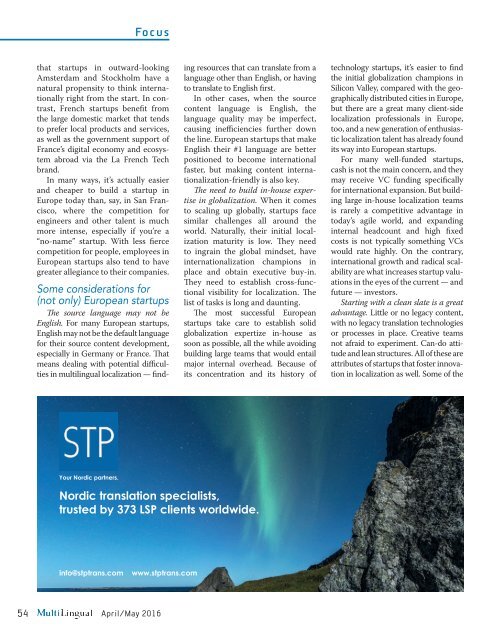Localization
z99kl79
z99kl79
Create successful ePaper yourself
Turn your PDF publications into a flip-book with our unique Google optimized e-Paper software.
Focus<br />
that startups in outward-looking<br />
Amsterdam and Stockholm have a<br />
natural propensity to think internationally<br />
right from the start. In contrast,<br />
French startups benefit from<br />
the large domestic market that tends<br />
to prefer local products and services,<br />
as well as the government support of<br />
France’s digital economy and ecosystem<br />
abroad via the La French Tech<br />
brand.<br />
In many ways, it’s actually easier<br />
and cheaper to build a startup in<br />
Europe today than, say, in San Francisco,<br />
where the competition for<br />
engineers and other talent is much<br />
more intense, especially if you’re a<br />
“no-name” startup. With less fierce<br />
competition for people, employees in<br />
European startups also tend to have<br />
greater allegiance to their companies.<br />
Some considerations for<br />
(not only) European startups<br />
The source language may not be<br />
English. For many European startups,<br />
English may not be the default language<br />
for their source content development,<br />
especially in Germany or France. That<br />
means dealing with potential difficulties<br />
in multilingual localization — finding<br />
resources that can translate from a<br />
language other than English, or having<br />
to translate to English first.<br />
In other cases, when the source<br />
content language is English, the<br />
language quality may be imperfect,<br />
causing inefficiencies further down<br />
the line. European startups that make<br />
English their #1 language are better<br />
positioned to become international<br />
faster, but making content internationalization-friendly<br />
is also key.<br />
The need to build in-house expertise<br />
in globalization. When it comes<br />
to scaling up globally, startups face<br />
similar challenges all around the<br />
world. Naturally, their initial localization<br />
maturity is low. They need<br />
to ingrain the global mindset, have<br />
internationalization champions in<br />
place and obtain executive buy-in.<br />
They need to establish cross-functional<br />
visibility for localization. The<br />
list of tasks is long and daunting.<br />
The most successful European<br />
startups take care to establish solid<br />
globalization expertize in-house as<br />
soon as possible, all the while avoiding<br />
building large teams that would entail<br />
major internal overhead. Because of<br />
its concentration and its history of<br />
technology startups, it’s easier to find<br />
the initial globalization champions in<br />
Silicon Valley, compared with the geographically<br />
distributed cities in Europe,<br />
but there are a great many client-side<br />
localization professionals in Europe,<br />
too, and a new generation of enthusiastic<br />
localization talent has already found<br />
its way into European startups.<br />
For many well-funded startups,<br />
cash is not the main concern, and they<br />
may receive VC funding specifically<br />
for international expansion. But building<br />
large in-house localization teams<br />
is rarely a competitive advantage in<br />
today’s agile world, and expanding<br />
internal headcount and high fixed<br />
costs is not typically something VCs<br />
would rate highly. On the contrary,<br />
international growth and radical scalability<br />
are what increases startup valuations<br />
in the eyes of the current — and<br />
future — investors.<br />
Starting with a clean slate is a great<br />
advantage. Little or no legacy content,<br />
with no legacy translation technologies<br />
or processes in place. Creative teams<br />
not afraid to experiment. Can-do attitude<br />
and lean structures. All of these are<br />
attributes of startups that foster innovation<br />
in localization as well. Some of the<br />
54 April/May 2016


